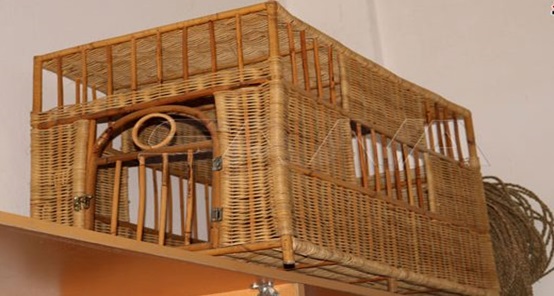Despite his disability , 37-year-old Eyad Khunda refused to surrender to frustration and despair, as he found in his favorite profession “bamboo making” a way out of a very difficult psychological and social situation that accompanied him during the first period of his tragedy in adapting to his new lifestyle.
Surrounded by numerous beautifully designed bamboo pieces and accompanied by his friends, Khunda sits in a small workshop at the
headquarters of the Blind Care Association in Lattakia, gossiping while his fingers move lightly and proficiently weaving the twisted straw around the bamboo sticks to create a variety of gift boxes, laundry baskets, tissue boxes and fruits and trash baskets.
 In an interview with SANA, Khunda said, “I was exposed to retinitis pigmentosa, which is usually stable at the beginning of the patient’s life and may develop or regress, but unfortunately, I had an eye injury, after completing my studies in the industrial vocational high school, that caused internal bleeding and a complete loss of vision.
In an interview with SANA, Khunda said, “I was exposed to retinitis pigmentosa, which is usually stable at the beginning of the patient’s life and may develop or regress, but unfortunately, I had an eye injury, after completing my studies in the industrial vocational high school, that caused internal bleeding and a complete loss of vision.
Khunda went on to say, “Losing my eyesight was not easy for me, as I found it is very difficult to adapt to the new situation. Despair and pain gripped me, but the support of my mother who accompanied me in my most difficult moments gave me the strength to overcome my ordeal.
Thanks to a young man, Ali Shakouhi, who lives in our neighborhood, I learned about the Blind Care Association, which I used to visit frequently. Its young visitors, “school and university students,” adults and volunteers, were my cause for hope.”
On his beginnings in learning this profession, he indicated that he learned the bamboo industry through a training project at the association under the supervision of Michel Pribhan and Ali Al-Shakouhi as he had exerted tremendous efforts to achieve success in this field that he liked. In over four years as he stressed, he was able to learn the basics of this craft, refine his skills, acquire the accuracy, speed and patience that are necessary to master it, stressing that he is filled with great happiness with every piece of art he accomplishes.
Khunda emphasized that the bamboo industry helped him rid himself of depression and weakness and enhanced his strength, self-confidence, and ability to adapt to various life circumstances. He pointed out that the support he received from his friends in the association was the real cause for the success of his project; in addition to the grant he obtained from the Syrian Trust for Development that provided him with the necessary equipment to cut, twist and tighten bamboo sticks.
 However, he suffers, as he mentioned, from the difficulty of marketing, as there is no permanent place to display his products, and he mainly relies on the association’s participation in exhibitions and charitable events to sell some of them.
However, he suffers, as he mentioned, from the difficulty of marketing, as there is no permanent place to display his products, and he mainly relies on the association’s participation in exhibitions and charitable events to sell some of them.
Ali Al-Shakouhi, a member of the association’s board of directors and a trainer in the professional support workshop for Bamboo works emphasized the importance of the educational, training and professional courses that the association holds for rehabilitating the blind and integrating them into society but it still needs more support, funding, and networking with public authorities and other non-governmental organizations.
“We are all proud of what Eyad has achieved. His Patience, enthusiasm, and determination to continue his life exerting more efforts to present handmade masterpieces with the available possibilities,” Al-Shakouhi concluded.
Amal Farhat

